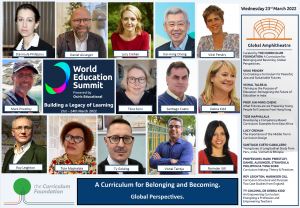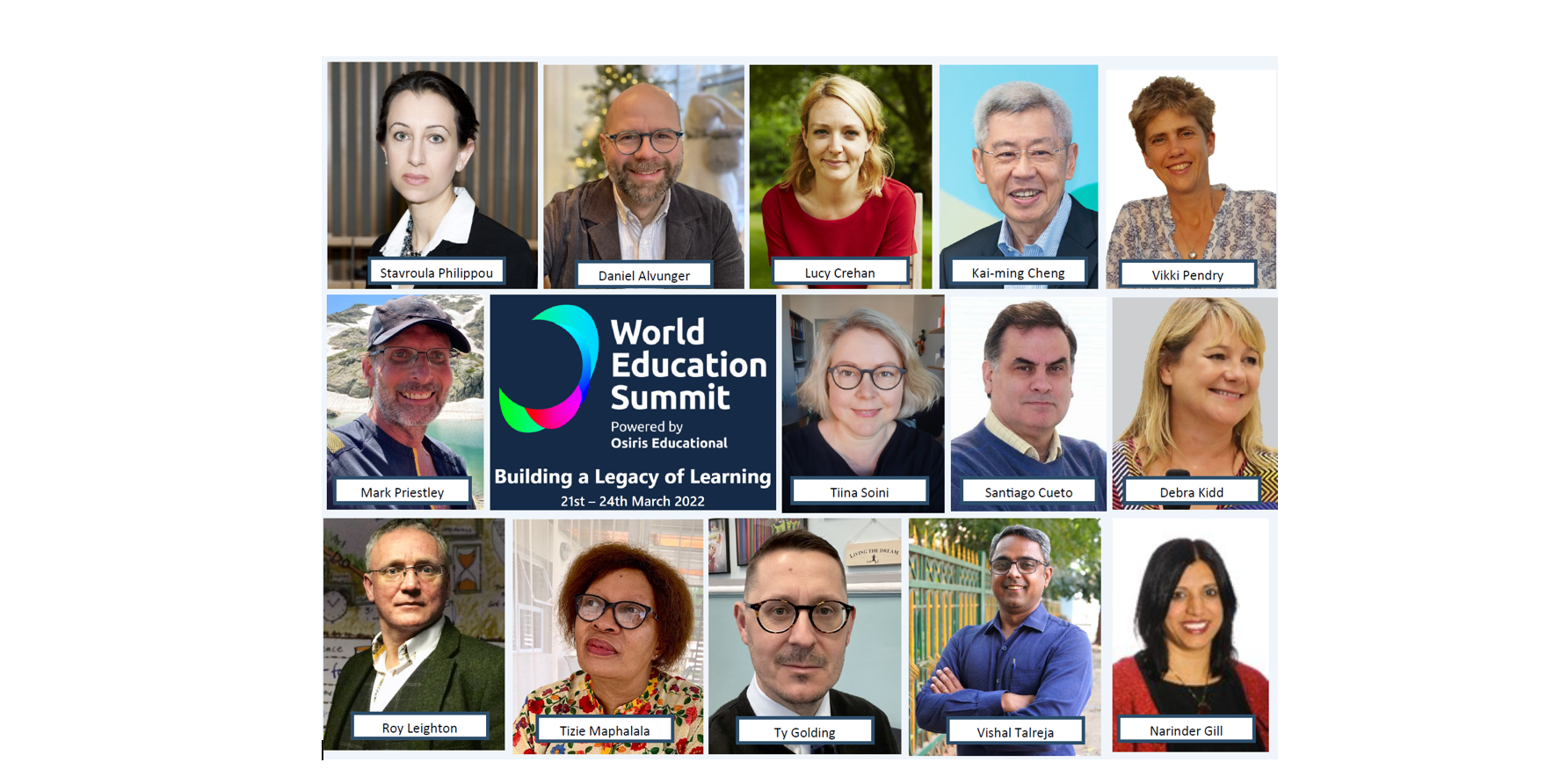World Education Summit 23rd March, 2022.
The World Education Summit (WES) is brought to the world by Osiris Educational*, a pioneering educational organisation. The Summit is the largest annual virtual gathering of the greatest minds in education, passionate teachers and brave leaders from every corner of the world.
The Curriculum Foundation are pleased to curate a day for the Summit which focuses on curriculum design and implementation aimed at bringing about social justice. Our contributors are globally renowned for their insight and wisdom as a result of their extensive experience in field.
The theme for the day is ‘A curriculum for belonging and becoming. Global Perspectives.’ Throughout the course of the day, we will explore diverse approaches to Curriculum Making aimed at supporting the development of effective citizenship and identity forming that is locally relevant and globally meaningful. Hosted by Vikki Pendry from the Curriculum Foundation, researchers, practitioners and policy makers will present and discuss the importance of co-creating a progressive curriculum that purposefully creates opportunities for children to build knowledge whilst exploring their ‘roots’ and developing a sense of their role within wider society. Presentations will feature descriptions of the structural elements of the curriculum (such as scope, sequence, balance and rigor) that blend with cultural concepts such as Ubuntu and Cynefin to bring about social justice, economic and environmental sustainability.
Tickets are available here.
We hope you will join us! Get in touch if you would like to present questions to our speakers in advance. admin@curriculumfoundation.org
The schedule for the day is as follows:
10am – Vikki Pendry – Co-creating a curriculum for peaceful, just and sustainable futures.
Vikki will launch the day by describing key features of different education systems globally that have developed a curriculum which have at their heart, the aim of enabling children to become compassionate citizens who are able and motivated to care for themselves, each other and the environment. Vikki will draw upon her experience of working with Ministries of Education, NGOs, teachers and children in diverse contexts to highlight the opportunities for creating communities where education is a vehicle for peaceful coexistence and just futures. Through examples of curriculum planning, implementation and evaluation that allows for knowledge, skills and attributes to evolve and flourish, Vikki will show that ‘curriculum’ is far more than a list of objectives. It’s everybody’s business to design experiences that are ‘world-class’, equipping young people with the ‘know-how’ that is the best FOR the world.
11am – Vishal Talreja – Thriving as the purpose of education. Reimagining the future of Education in India.
Since the Covid-19 pandemic, young people have been dealing with enormous uncertainty, grief and loneliness. As the impact of the pandemic further unfolds, it has become abundantly clear that traditional learning models have ill-equipped our children to respond to the current crisis. Our current system of education which emerged in the 19th century is no longer relevant in this fast-changing world. It is time we reimagine the future of education from an academically focused model to a personalized, contextualized, localized education transformation model that is designed for equity, dignity and inclusion of every child and invested in helping every child Thrive.
12noon – Professor Kai-ming Cheng – What futures are we preparing young people for? Lessons from Hong Kong.
Preparing young people for the future: What future? Society has changed, but what are the changes, and what changes are the most fundamental. The pandemic has challenged the “normal” of work and life. Technologies have also changed the modes of operations and communication. However, all these could be seen as just accelerating the more fundamental changes that undermine the basic assumptions about the economy, organisations, notion of jobs, and position of individuals in society. All these pose a basic question for education – If we are supposed to prepare young people for the future, how much do we know about the future?
1pm – Tizie Maphalala – Developing a competency-based curriculum. Examples from East Africa
Many schools across east and southern Africa have a myriad of challenges in realising classrooms that provide effective learning. We have many learners who are enthusiastic and determined to succeed. We also have teachers who are determined to find good opportunities to provide the education that young people need and deserve, but they often have to overcome barriers to do so. The barriers can seem great, but it is possible to find good opportunities for learning. We will discuss how the enthusiasm of learners can be harnessed and how resources available in the local environment can be used to create effective learning.
2pm – Lucy Crehan – The importance of the middle tier in curriculum design.
As education systems move away from traditional knowledge-led national curricula to give more autonomy to schools and teachers, they create more opportunities for learning to be meaningful, relevant and localised. However, in several countries that have taken this curricular turn, these goods have been at the expense of curricular coherence, and occasionally, equity. Lucy will draw on her experiences in several education systems, including recent project work in Wales, to describe a possible ‘sweet spot’ in the organisation of curriculum design, which allows for both localised curricula and curriculum coherence.
3pm – LUNCH BREAK
4pm – Santiago Cueto Caballero – Young Lives: Early skills, inequalities and educational opportunity. Evidence from a longitudinal study in Peru, India, Vietnam and Ethiopia.
Young Lives is a mixed-methods, longitudinal study carried out since 2002 in Ethiopia, India, Peru and Vietnam (https://www.younglives.org.uk). In this presentation, Santiago will present data on the educational trajectories of children of the younger cohort, which we have followed since age one year. With variations among countries, the data suggests that children from poor or rural contexts, indigenous, or with disabilities, face lower levels of educational opportunities and are less likely to access higher education. This, plus gender differences in some contexts, show that inequality is perhaps the greatest priority that educational systems in face in developing countries. The pandemic has made the situation worse for many children. The presentation will discuss policy alternatives.
5pm – Professor Mark Priestley, Associate Professor Daniel Alvunger, Assistant Professor Stavroula Philippou, Dr Tiina Soini Curriculum making: theory and practices
In this seminar, Mark and his colleagues will explore different conceptions of curriculum making. Drawing upon previous conceptualizations, we offer an elaborated approach to understanding curriculum making. This is a heuristic rather than a normative framing, being essentially non-linear, framed around the concept of intertwined sites of activity – supra, macro, meso, micro and nano – with curriculum making viewed as types of activity rather than institutional functions. We consider the implications of this understanding, including the importance of meso activity (e.g. support infrastructure), which sits between macro policy and micro school-based curriculum making. This appears to be a key factor in enhancing curriculum making.
6pm – Roy Leighton and Narinder Gill – Curriculum structure and purpose. Two case studies from England
Narinder will share a multi-stakeholder approach to the process of creating a Trust-wide curriculum framework. Narinder will explain the way in which the Framework is aimed at providing an accessible framework for all of those involved in designing learning experiences within schools so that all young people are able to flourish in thriving communities. Narinder will explain in particular how to design a curriculum that it is driven by the local context and school community.
Creating A Culture of ‘Positive Peace’. Roy will share practical strategies to show how to avoid getting into negative and destructive conflicts with colleagues, families and students. For those already experiencing the debilitating and disheartening impact of being caught up in a spiral of conflict, he will show how the cycle of ‘violence’ can be transformed into one of insight, learning and benefit for yourself, others and your environment.
7pm – Ty Golding and Dr Debra Kidd – An Empowering Curriculum: Energising a Profession and Empowering Teachers
Ty will describe the Curriculum for Wales as an opportunity for both increased professional agency and professional development. Ty will discuss the role of school leaders, how to enable agency for teachers and will share examples and provocations regarding our approaches to translating the policy into practice in schools.


Thanks for this information..